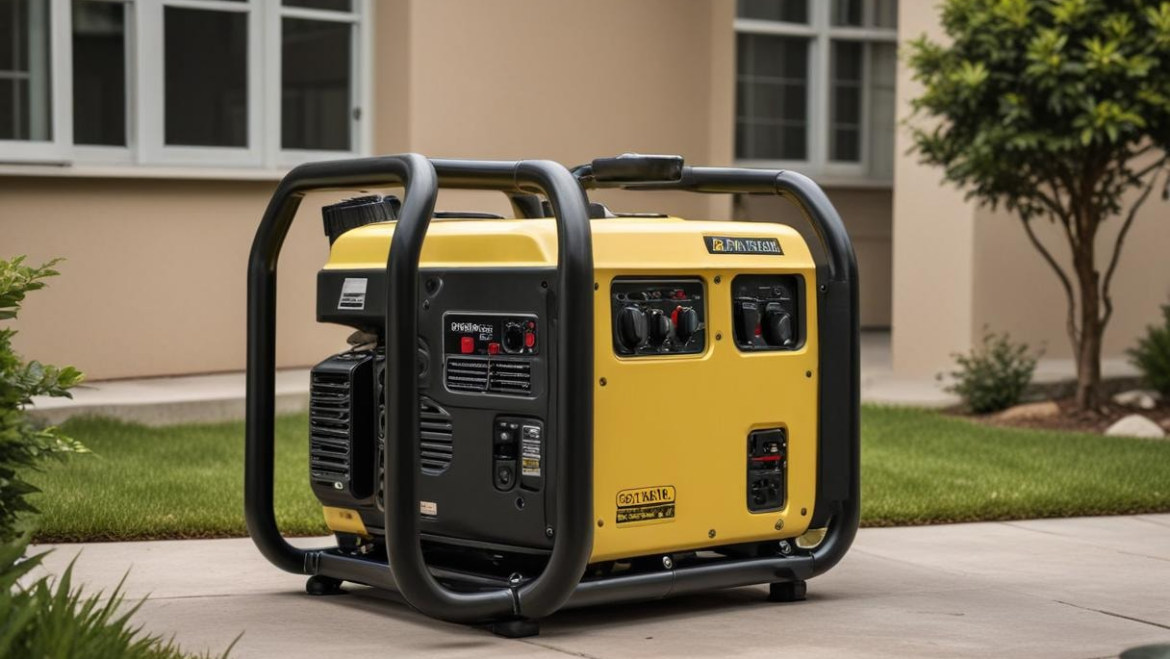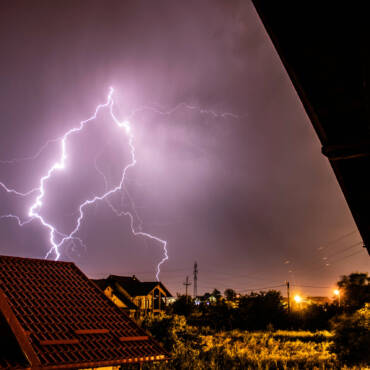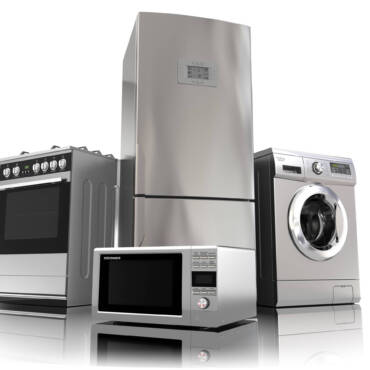Finding the right generator for your home can prove quite challenging, especially if it’s your first time buying one.
They come in many different shapes and sizes, making it easy to get lost and pick one that doesn’t fit your power requirements.
The ideal generator for your home should have enough wattage to power your essential appliances like your air conditioner, portable space heater, and HVAC systems.
This article will discuss the different types of generators, how to choose one for your home, and how to use it correctly during a power outage.
Different Types of Generators for Homes
Knowing the difference between these other models of home generators will help you choose the ideal one for your home.
1. Portable Generators
A portable generator is a small, lightweight portable generator that runs primarily on gasoline to power your home. This tool works by converting mechanical energy into electrical energy.
As the engine runs, it drives an alternator consisting of a stator and a rotor, creating an alternating current (AC). Depending on how much power you need, the power usage of a portable generator ranges anywhere from 1 kilowatt (kW) to 10kW and above.
A small portable generator is designed to power small appliances and electronics, such as lights, fans, or portable heaters.
Larger models are more robust and capable of powering more demanding equipment like refrigerators, sump pumps, power tools, or even entire RVs.
2. Home Standby Generators
Also called a permanent house generator, a home standby generator is one that’s fixed into one area of your property. They’re much larger than their portable power station counterparts and have massive power outputs of 20-150kW.
This makes a standby generator an excellent choice for homeowners who want to supply their entire house with electricity during a power outage.
The beauty of a standby generator is that it activates immediately when the power goes out during power outages. This is done through an automatic transfer switch that monitors your power usage and your home’s power supply.
When it detects a power loss, it immediately signals the standby generator to start. This seamless transition of the backup power source is where standby generators got their name.
Standby generators also rely on engines to produce mechanical energy, which is then converted by the alternator to keep electricity flowing in your home.
3. Inverter Generators
Inverter generators are a type of portable power generator that’s decked out with advanced circuitry to provide a cleaner, more stable backup power source. The generator produces AC (alternating current) electricity and converts it to DC (direct current) power.
The generator then takes the DC power and inverts it back to clean AC power through a microprocessor-controlled inverter.
This process ensures a stable and consistent flow of electricity, thus minimizing voltage fluctuations that could otherwise damage sensitive electronics like laptops, computers, and smartphones.
Aside from providing a clean power source, inverter generators tend to be more fuel-efficient than traditional generators.
A standard portable generator runs at a constant speed of 3600 RPM to maintain a steady 60Hz power output, regardless of load demand. This leads to higher fuel consumption and more noise, even when minimal power is needed.
Meanwhile, inverter generators adjust the engine speed according to the power demand. This leads to a more fuel-efficient consumption and less noise from the inverter generator itself.
4. Solar Generators
Solar generators are aptly named because they take energy from the sun and convert it into electrical energy using photovoltaic (PV) solar panels.
These solar panels consist of cells that absorb the sun’s rays and convert them into DC electricity to provide power to your entire house.
Once the solar panels generate DC electricity, it is typically stored in a battery for later use in a power station. The stored renewable energy gets used when sunlight is not available, such as during the night or on cloudy days.
The stored DC electricity can then be converted to AC using an inverter, as most household appliances and electronic devices typically run on AC power.
Solar generators work best for homeowners living in warm, sunny climates, as the PV panels will absorb the most solar energy. While a full solar panel or generator will still work in cloudy weather, it will generate less electricity at a less efficient rate.
Solar systems and generators can have significantly different capacities. While a residential solar power system typically falls within the 5-7kW range, solar generators can range from small portable units to large-scale installations. The necessary capacity is determined by each household’s specific energy requirements.
How to Choose the Best Generator for Home Use
Choosing the best generator for your home requires careful planning and consideration to ensure it meets your power requirements. Ideally, you want to keep these factors in mind when making a purchase:
Power Requirements
Home generators are rated in kilowatts (kW), which is the amount of power converted to electrical use.
Knowing how much power you have is crucial to ensure you buy an appropriately sized generator to suit your intended applications.
To do this, start by listing the appliances you need to keep on during power outages. The basics include water heaters, air conditioners, refrigerators, and HVAC systems.
From there, you want to calculate the wattage for each appliance you intend to use. You can refer to the labels on the appliances or use this formula to calculate the wattage:
Watts = Volts × Amps
For example, a 120v air conditioner that uses 6.5 amps will consume more power than 780 watts.
The next step is to add the wattage of all your other essential devices and appliances to get a rough estimate of your total power requirement.
From there, use the total number to choose a generator with a capacity that meets or exceeds your calculated total wattage.
Keep in mind that some appliances have higher starting watts (surge watts) compared to their running wattage. If you plan on adding more appliances in the future, make sure to add them to your total power requirement as well.
It’s often recommended to select a generator with 20-25% more capacity than your estimated needs to ensure reliability and accommodate any additional unexpected loads.
Fuel Type
With the exception of a solar panel generator, most home generators rely on a fuel source to start the engine and generate electricity. Different generators use different fuel sources like gasoline, diesel fuel, natural gas, or propane. Choosing the right unit depends on your specific needs during a power outage.
Gasoline:
Gas-powered generators are often popular due to their initial affordability and widespread availability of fuel. But, gasoline is highly flammable and has a relatively short shelf life. Gasoline itself should be stored in a well-ventilated area, but the generator should never be operated indoors due to the risk of carbon monoxide poisoning.
Diesel:
Diesel generators are known for their durability and fuel efficiency. Since it’s less flammable than gasoline, it’s generally the safer option for long-term storage.
These generators tend to be more reliable than gas-powered generators and can handle heavier loads much more efficiently. The only drawbacks are the loud noise diesel engines make and they produce more emissions compared to other types of generators.
Natural gas or propane:
Propane and natural gas generators offer a cleaner burning alternative, producing fewer emissions and requiring less maintenance.
Natural gas generators are often connected directly to the home’s gas lines, providing an almost limitless fuel supply as long as the gas lines are operational.
On the other hand, Propane’s long shelf life is perfect for situations where power outages are more common.
Do note that in areas prone to natural disasters where gas lines can get disrupted, these options may be less reliable than their gasoline and diesel counterparts.
Features
Some home generators offer a more sophisticated set of features that may otherwise influence your purchase decision. While not necessary, these features can come in quite useful when you need them in a pinch.
Multi-Fuel Generators
These types of standby models of generators have dual-fuel or tri-fuel capabilities which allow them to run on gas, diesel, or propane.
They also have higher tank capacity and greater fuel efficiency. If you live in areas where power outages are long, then a multi-fuel generator is an excellent investment.
Advanced Safety Tech
Higher-end generators offer advanced safety features like carbon monoxide detectors, fuel sensors, and overheating protection.
The sensors routinely check the generator’s running condition and perform an automatic shutoff immediately if they detect unstable operation.
Automatic Load Management
Other advanced features found in high-end standby generators include load management systems, which prioritize and manage electrical loads to optimize performance and longevity, and sophisticated control panels with digital displays that offer detailed information on the generator’s status and maintenance schedules.
Weather Resistance
Premium standby generators are built with weather resistance in mind. They feature anti-corrosion paint and have extended warranties compared to standard standby generators. Consider a model made with durable materials if you live in an area where precipitation is frequent.
Noise Level
If you live in an area with strict noise regulations, then choosing a quieter home generator is a sound idea.
Look for inverter generators with sound-dampening insulation and quieter mufflers. These inverter models are extremely quiet and can typically reduce sound output by 10 decibels (dB) and above compared to traditional generators.
When shopping for a home generator, look for the dB rating. The lower the dB rating, the quieter the model will be when in use.
Best Practices When Using a Home Generator
Having a home generator is a huge lifesaver when the power goes out. However, there’s more to using these machines than just powering them on and turning them off. Following these best practices will ensure your unit will operate safely and efficiently.
Observing Proper Installation
Generators produce carbon monoxide emissions as a result of an incomplete burn of fuel when the engine is running.
Because carbon monoxide is odorless and invisible, this gas can quickly accumulate to deadly levels inside an enclosed space. That’s why home generators should always be installed in an area with proper ventilation to avoid carbon monoxide poisoning.
Also, consider installing a carbon monoxide detector inside your home to avoid potentially life-threatening situations.
Conducting Routine Maintenance
Home generators require routine maintenance to maintain fuel efficiency and avoid costly downtime during power outages.
It’s always a good idea to follow manufacturer instructions on caring for and maintaining your specific unit. Some things to look out for include spark plug wear, clogged air filters, and the engine’s oil condition.
When storing the generator, make sure it’s stored in a clean, dry area away from direct sunlight. Always check the fuel gauge and drain the tank before storage to eliminate the risk of fire hazards.
Proper Fuel Storage
Storing highly flammable liquids like gasoline, diesel, and liquid propane requires a careful and meticulous approach.
As a general rule, you do not want to store gasoline and diesel for long periods because they degrade over time.
This degradation causes a whole host of issues like gum formation, loss of volatility, and chemical instability that will inevitably harm your generator’s engine.
The good news is that you can store propane indefinitely, provided the right conditions are met.
Propane tanks should always be stored in outdoor areas that have ample shade to avoid direct sun exposure.
Avoiding Generator Overload
Overloading happens when the number of power appliances in use exceeds the rated power output of the generator.
When this happens, the engine heats up, causing it to burn more fuel and inevitably damage the internal components like the pistons and cylinder walls.
Make a list of all the appliances you plan to use and ensure the total wattage falls under the generator’s capacity. Doing so will help preserve the lifespan of your generator and keep it running at optimal efficiency.
Electrical Safety During Power Outages
Home generators pose electrical hazards when used incorrectly. The first rule of thumb is to never operate a portable generator when it’s raining as electricity flowing is dangerous when
If you absolutely must operate your generator outdoors in heavy rain, it’s best to invest in a rain cover to protect your unit from inclement weather.
Keep Your Lights on During Power Outages With Danley 911 Home Services Electrical
Need help with finding the right generator for your home? Danley 911 Home Services Electrical has got you covered. With their wide range of Generac branded generators, you can feel confident that your home will remain powered in case of a power outage.
Their licensed electricians are more than qualified to conduct generator installation, ensuring your safety and peace of mind. To learn more about their services, give them a call at (732) 432-0164.
FAQ About Best Generator for Home
What size generator do I need for my home?
Most homes can get away with using a generator with a capacity of 10kW and above. Still, it’s best to calculate your power requirements to determine the generator that is the appropriate size.
Can a portable generator power an air conditioner?
Yes. A portable generator with a capacity of 5kW and above can safely run a window air conditioner.
How much does it cost to install a standby generator?
The cost of installing a standby generator ranges from around $2,000 to $20,000. It’s best to have a licensed installer work with your generator for safety purposes.



